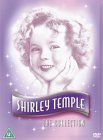 Shirley Temple: The Collection | DVD | (25/10/2004)
from £N/A
| Saving you £N/A (N/A%)
| RRP
Shirley Temple: The Collection | DVD | (25/10/2004)
from £N/A
| Saving you £N/A (N/A%)
| RRP A collection of classic Shirley Temple films! Heidi (1937) When her aunt tires of caring for her orphan Heidi is taken into the Swiss mountains to live with her gruff grandfather (Jean Hersholt) a hermit who comes to adore her. But the aunt returns to steal Heidi away selling her to a family whose invalid daughter (Marcia Mae Jones) needs a companion. Bullied by an evil governess (Mary Nash) Heidi still charms the entire household and never stops trying to returnito her
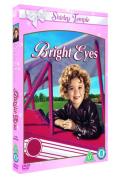 Bright Eyes | DVD | (07/08/2006)
from £6.00
| Saving you £6.99 (116.50%)
| RRP
Bright Eyes | DVD | (07/08/2006)
from £6.00
| Saving you £6.99 (116.50%)
| RRP When a maid is accidentally hit by a car and killed her young orphaned daughter is forced to live with the snooty couple her mother used to work for. A custody battle soon ensues between an aviator who adores the little girl and the couple's crotchety Uncle Ned.
![Shirley Valentine/First Wives Club/Terms Of Endearment [DVD]](/pictures/1096274.jpg) Shirley Valentine/First Wives Club/Terms Of Endearment | DVD | (05/10/2009)
from £22.72
| Saving you £-6.73 (N/A%)
| RRP
Shirley Valentine/First Wives Club/Terms Of Endearment | DVD | (05/10/2009)
from £22.72
| Saving you £-6.73 (N/A%)
| RRP Titles Comprise: Shirley Valentine: Shirley Bradshaw has always been able to see the funny side of any situation. She was a high-school rebel and now she's a housewife and mother who one day looks back at her life and realises that she has lost touch with her dreams. When her best friend wins a magazine contest and asks Shirley to accompany her on a fortnight's holiday in Greece Shirley begins a voyage of self-discovery. On the island of Mykonos as Shirley luxuriates among sun sand and taramasalata she encounters islander Costas Caldes and falls in love...with life! First Wives Club: Marriage has turned into a crash dive for Brenda Cushman Elise Atchison and Annie Paradise. These three well-heeled Manhattan women chums during their college days all took different paths. Now they're reunited by catastrophe--each has just been callously dumped by her husband for a younger sexier trophy wife. Smarting from the pain Brenda Elise and Annie join forces and concoct a plan to exact the most exquisitely bitter vengeance upon their exes. War has been declared Terms of Endearment: This Oscar-winning film is both eccentrically funny and an old-fashioned tearjerker. The story centers around the volatile relationship between a mother and daughter spanning 30 years. The various permutations of their lives are examined including the daughter's bout with terminal cancer.
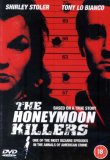 The Honeymoon Killers | DVD | (06/12/2004)
from £5.00
| Saving you £-2.01 (N/A%)
| RRP
The Honeymoon Killers | DVD | (06/12/2004)
from £5.00
| Saving you £-2.01 (N/A%)
| RRP Though it was pre-produced by Martin Scorsese, who left the project after arguments with the producers, The Honeymoon Killers wound up being written and directed by Leonard Kastle, one of cinema's great one-hit wonders. The Henry: Portrait of a Serial Killer of 1969, The Honeymoon Killers follows hefty nurse Martha Beck (Shirley Stoler, who looks like a humourlessly malevolent Roseanne) and her low-rent gigolo lover Raymond Fernandez (Tony Lo Bianco) as they take up serial murder for profit and passion, luring middle-aged women into marriage through lonely-hearts ads, then killing them and raiding their savings. Based on a genuine crime case history, it is filmed in the candid-camera style of a Frederick Wiseman documentary. The intense scenes (such as the couple's frightening love-play: escalating arguments that end in awkward killings) unfold with a fly-on-the-wall dryness, showcasing the extraordinary acting of the leads and their cameo victims. A rare film in which genuine romantic love does not excuse the central couple's amoral behaviour, this still manages to generate some sympathy for the truly monstrous Martha. The washed-out black and white photography and sometimes scratchy soundtrack (the score is sampled from Mahler) have a deliberately amateurish feel which adds to the film's chilling power, lodging it into the memory. On the DVD: Along with a lurid trailer and gallery of images are filmographies for Stoler, Lo Bianco and (redundantly) Kastle. The widescreen transfer is excellent, representing perfectly the film's rough-hewn look but also bringing out a lot of detail--like Stoler's freckles, which have looked like grain on video releases. --Kim Newman
![My Beautiful Laundrette [1985]](/pictures/1006225.jpg) My Beautiful Laundrette | DVD | (10/09/2001)
from £10.43
| Saving you £-0.44 (N/A%)
| RRP
My Beautiful Laundrette | DVD | (10/09/2001)
from £10.43
| Saving you £-0.44 (N/A%)
| RRP In case you'd forgotten, My Beautiful Laundrette will remind you of those mid-80s days when Thatcherism ruled the earth (or so it seemed) and money was king. Stephen Frears' low-budget realisation of Hanif Kureishi's subversively critical play captures the contradictions of that time in a way that's as fresh today as when it was new. Omar's wheeler-dealer uncle, Nasser (Saeed Jaffrey), sums it up when he says, "In this damn country, which we hate and love, you can get anything you want". He sets up Omar (Gordon Warnecke) with a rundown laundrette and the instruction to make it a success, which Omar temporarily does, with the help of his childhood friend Johnny (Daniel Day-Lewis). When the film first came out, it was the gay content that dominated the column inches, whereas now it seems a sensitive and multi-faceted summation of its decade, exploring social, ethnic and sexual issues and contradictions. Bringing together two such different characters as Omar--Asian, ambitious, for whom success is defined by wealth--and former childhood friend Johnny--white trash, ex-National Front--was inspired. Watching their friendship develop into love, and the ensuing bitterness and misunderstanding that they suffer from friends and family is very poignant. All the lead roles are well taken, the contradictory character of Nasser in particular. By turns, funny, touching and anger-inducing, this is a movie that wears its age lightly and its era proudly. On the DVD: the picture is in 4:3 ratio with a Dolby Digital soundtrack. There's an original trailer and filmographies of the four main characters, with an additional biography for Day-Lewis. --Harriet Smith
![Two Mules For Sister Sara [1970]](/pictures/1003171.jpg) Two Mules For Sister Sara | DVD | (19/08/2002)
from £7.46
| Saving you £2.53 (33.91%)
| RRP
Two Mules For Sister Sara | DVD | (19/08/2002)
from £7.46
| Saving you £2.53 (33.91%)
| RRP Set in Mexico a nun called Sara is rescued from three cowboys by Hogan (Clint Eastwood) who is on his way to do some reconnaissance for a future mission to capture a French fort. The French are chasing Sara but not for the reasons she tells Hogan so he decides to help her in return for information about the fort defences. Inevitably the two become good friends but Sara has a secret..
 Shirley Temple Triple Pack 1 | DVD | (07/08/2006)
from £N/A
| Saving you £N/A (N/A%)
| RRP
Shirley Temple Triple Pack 1 | DVD | (07/08/2006)
from £N/A
| Saving you £N/A (N/A%)
| RRP Dimples: Temple stars as a young singer who entertains the New York crowds providing the window of opportunity for her pick pocket of a grand father to carry out his work. A rich lady sees the young girl peforming - and after discovering her grim existence with her grand father - offers her an opportunity to rise out of lifestyle... The Littlest Rebel: Shirley Temple's father a rebel officer sneaks back to his rundown plantation to see his family and is arrested. How
![Music Man [Blu-ray] [US Import]](/pictures/1152511.jpg) Music Man | Blu Ray | (02/02/2010)
from £N/A
| Saving you £N/A (N/A%)
| RRP
Music Man | Blu Ray | (02/02/2010)
from £N/A
| Saving you £N/A (N/A%)
| RRP ![Bulldog Breed, The / One Good Turn [1960]](/pictures/1012480.jpg) Bulldog Breed, The / One Good Turn | DVD | (12/05/2003)
from £N/A
| Saving you £N/A (N/A%)
| RRP
Bulldog Breed, The / One Good Turn | DVD | (12/05/2003)
from £N/A
| Saving you £N/A (N/A%)
| RRP In 1960, Norman Wisdom was left all at sea in The Bulldog Breed. He had already made a farce of the army in The Square Peg (1958), so what better than to join the navy? Back in the real world, the Russians had kick-started the space race putting Sputnik into orbit, so Norman rapidly finds himself selected to be the first Brit in space. Playing to type, the result is excellent physical comedy and copious tomfoolery at the expense of the upper ranks. With support from John Le Mesurier and Edward Chapman (the legendary "Mr Grimsdale") and uncredited appearances from Oliver Reed and Michael Caine, this is a notable British comedy, with an unusually direct reference to the risqué Carry On movies. For his second starring role Norman Wisdom played the oldest orphan of Greenwood Children's Home in 1954's One Good Turn. Not only does he have to find the money to buy one of the orphans a model car, but after a visit to Brighton he discovers Greenwood is due to be closed down by the home's own unscrupulous chairman, a property developer with plans to build a factory on the site. Also starring Thora Hird, One Good Turn was surely a film with a personal resonance for Wisdom who was himself brought-up in an orphanage after his mother died and his father was unable to raise him. As would become a tradition, he contributes a song, "Please Opportunity", and the movie, though produced by Rank, now sits easily in that classic Ealing era where the ordinary man took on the big guys and won. The innocent knockabout humour remains appealing. --Gary S Dalkin
 Athens Olympic Review 2004 | DVD | (04/10/2004)
from £19.93
| Saving you £0.06 (0.30%)
| RRP
Athens Olympic Review 2004 | DVD | (04/10/2004)
from £19.93
| Saving you £0.06 (0.30%)
| RRP All the highlights from the 2004 Olympic games with this official commemorative DVD. Featuring a special section on the British medal winning athletes.
![Doctor In Clover [1966]](/pictures/1012533.jpg) Doctor In Clover | DVD | (14/04/2003)
from £N/A
| Saving you £N/A (N/A%)
| RRP
Doctor In Clover | DVD | (14/04/2003)
from £N/A
| Saving you £N/A (N/A%)
| RRP More comical situations at St. Swithins Hospital when Dr. Grimsdyke returns for a course and develops a rejuvenating drug...
![The Claim [2001]](/pictures/1019136.jpg) The Claim | DVD | (30/06/2003)
from £7.05
| Saving you £-1.06 (N/A%)
| RRP
The Claim | DVD | (30/06/2003)
from £7.05
| Saving you £-1.06 (N/A%)
| RRP Set in a remote Californian town in the late ninteenth century this is tale of a man who sold his family for the claim to a gold mine years earlier.
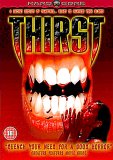 Gorebox - Christmas Special | DVD | (22/03/2004)
from £6.97
| Saving you £10.01 (251.51%)
| RRP
Gorebox - Christmas Special | DVD | (22/03/2004)
from £6.97
| Saving you £10.01 (251.51%)
| RRP An intelligent modern day vampire tale.... eerily creepy! A woman is captured by a secret cult and told she is to be their leader. She soon finds out they're all vampires and they intend to use her blood for ceremonies....
 Our Little Girl | DVD | (20/02/2006)
from £14.84
| Saving you £-1.85 (N/A%)
| RRP
Our Little Girl | DVD | (20/02/2006)
from £14.84
| Saving you £-1.85 (N/A%)
| RRP A little girl is so badly affected by her parents' divorce she decides to run away from home...
![Saturday Night And Sunday Morning [1960]](/pictures/1012549.jpg) Saturday Night And Sunday Morning | DVD | (14/04/2003)
from £N/A
| Saving you £N/A (N/A%)
| RRP
Saturday Night And Sunday Morning | DVD | (14/04/2003)
from £N/A
| Saving you £N/A (N/A%)
| RRP A key film of the British New Wave 'Saturday Night And Sunday Morning' was a great box-office success - audiences were thrilled by its anti-establishment energy the gritty realism of its setting and most of all by a working-class hero of a fresh and outspoken kind. Based on Alan Sillitoe's largely autobiographical novel the film is set in the grim industrial streets and factories of Nottingham where Arthur Seaton spends his days at a factory bench his Saturday evenings in the local pubs and his Saturday nights with Brenda (Rachel Roberts) wife of a fellow factory worker. Played by Albert Finney with an irresistable animal vitality Arthur is anti-authority (Don't let the bastards grind you down) and unashamedly amoral (What I'm out for is a good time. All the rest is propoganda). With powerful central performances cracking dialogue by Sillitoe and a superb jazz score by Johnny Dankworth 'Saturday Night And Sunday Morning' still stands as a vibrant modern classic.
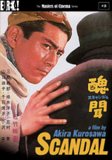 Scandal | DVD | (14/11/2005)
from £5.54
| Saving you £14.45 (72.30%)
| RRP
Scandal | DVD | (14/11/2005)
from £5.54
| Saving you £14.45 (72.30%)
| RRP On holiday in the snow-covered mountains young painter Ichiro Aoye (Toshiro Mifune) has a chance meeting with the popular singer Miyako Saijo (Shirley Yamaguchi). After giving her a ride back to the hotel where they are both staying Ichiro is photographed with Miyako by paparazzi. A magazine creates an expos of their 'secret romance' based around this photograph and the brooding Ichiro ignites a bitter and dirty libel case in order to restore their honour... Akira Kurosawa's
 Further Up The Creek | DVD | (12/07/2004)
from £N/A
| Saving you £N/A (N/A%)
| RRP
Further Up The Creek | DVD | (12/07/2004)
from £N/A
| Saving you £N/A (N/A%)
| RRP Crikey! The Royal Navy has finally entered the nuclear age and is selling off its obsolete old frigates to the Arabs!
![Tiger On The Beat [1990]](/pictures/1001924.jpg) Tiger On The Beat | DVD | (26/01/2004)
from £39.99
| Saving you £-23.00 (N/A%)
| RRP
Tiger On The Beat | DVD | (26/01/2004)
from £39.99
| Saving you £-23.00 (N/A%)
| RRP Chow Yun Fat stars as Francis Li a maverick and notoriously lazy HK police sergeant who is partnered with ""by the book"" rookie cop Michael Tso (martial arts legend Conan Lee). Their investigations into a drug trafficking operation lead them to a beautiful aerobics instructor Marydonna (Nina Li Chi) the sister of one of the gangsters under suspicion. When her brother is murdered by his associates for attempting to double-cross them Marydonna finds herself being sought by the same
![Carry On Sergeant [1958]](/pictures/1013041.jpg) Carry On Sergeant | DVD | (27/08/2001)
from £9.40
| Saving you £4.59 (48.83%)
| RRP
Carry On Sergeant | DVD | (27/08/2001)
from £9.40
| Saving you £4.59 (48.83%)
| RRP The first of the Carry On movies, 1958's Sergeant is rather different from its successors, much more a film of its time (the latter days of National Service) and rather less a bawdy picture postcard. Sergeant Grimshaw (William Hartnell long before Doctor Who) is about to retire and hopes that he can get his last platoon into shape as Champion Platoon of its intake. Unfortunately, the new recruits include the clumsy Golightly (Charles Hawtrey), the barrack-room lawyer Bailey (Kenneth Williams) and the hypochondriac Horace Strong (Kenneth Connor). Love interest is provided by Bob Monkhouse and Shirley Eaton--newlyweds separated by the call-up and reunited by her taking a job in the canteen--and by the pursuit of Horace by Dora Bryan's Nora. The film relies heavily on a mixture of slapstick and paradoxical revelations of character complexity--the obnoxious Bailey nonetheless takes the trouble to coach the incorrigibly dense Herbert (Norman Rossington); the series' later obsession with low comedy only really emerges in the scenes between Horace and the medic Captain Clark (Hattie Jacques). The platoon's eventual coming together as other than total incompetents is predictable, but likable.On the DVD: The DVD has no frills whatever except for a widescreen picture and chapter selections; it has been cleaned up however so that we get a remarkably crisp mono picture and mono sound, which brings out the quality of the military-band score by Bruce Montgomery, who was also the writer Edmund Crispin. --Roz Kaveney
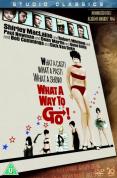 What A Way To Go | DVD | (17/04/2006)
from £N/A
| Saving you £N/A (N/A%)
| RRP
What A Way To Go | DVD | (17/04/2006)
from £N/A
| Saving you £N/A (N/A%)
| RRP What A Cast! What A Past! What A Show! This black comedy opens with Louisa Foster donating a multimillion dollar check to the IRS. The tax department thinks she's crazy and sends her to a psychiatrist. She then discusses her four marriages in which all of her husbands became incredibly rich and died prematurely because of their drive to be wealthy...

Please wait. Loading...
This site uses cookies.
More details in our privacy policy